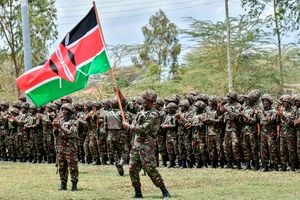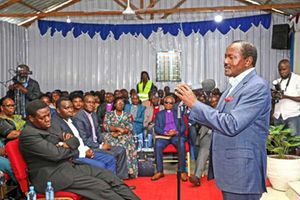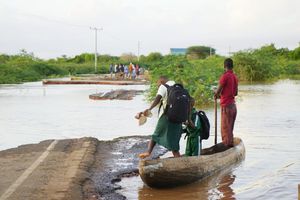Decolonising the mind: Ngugi tours South Africa

Molara Wood listens in as Ngugi wa Thiongo reads an excerpt from his book Detained: A prison writers diary during the Ake Arts and Literature festival held in Abeokuta, Nigeria on November 19, 2016. PHOTO | ANNE MUCHEKE
What you need to know:
- The public lectures were timely and came at a time when South African universities are themselves fighting to decolonise, led by student movements such as #FeesMustFall and #RhodesMustFall. He is currently a distinguished professor at University of California, Irvine.
- So far, the movements are beginning to bear fruit. For instance, at Wits University, two buildings have been renamed after politician Solomon Mahlangu and South African scholar Robert Sobukwe.
- Ngugi was welcomed at Wits University’s Wits Great Hall with song and dance by students on March 2, 2017. The songs included a decolonized version of the South African anthem. All the 1,035 sitting positions had been taken up. The event was also broadcasted around the world via a live weblink.
Celebrated scholar, playwright, activist and author Prof Ngugi wa Thiong'o has concluded his public lecture series in South African universities. He visited the University of Witwatersrand (Wits University), University of Cape Town and the University of Fort Hare, where he gave lectures on the decolonisation of Africa, and especially African universities.
Ngugi is seen as the father of decolonisation in Africa after successfully decolonising the Department of Literature at the University of Nairobi in 1970s. The public lectures were timely and came at a time when South African universities are themselves fighting to decolonise, led by student movements such as #FeesMustFall and #RhodesMustFall. He is currently a distinguished professor at University of California, Irvine.
So far, the movements are beginning to bear fruit. For instance, at Wits University, two buildings have been renamed after politician Solomon Mahlangu and South African scholar Robert Sobukwe. Other proposed decolonisation changes include curriculum reforms, language policy and changing institutional culture. At University of Cape Town, the statue of Cecil Rhodes has been brought down through the #RhodesMustFall movement.
Ngugi was welcomed at Wits University’s Wits Great Hall with song and dance by students on March 2, 2017. The songs included a decolonized version of the South African anthem. All the 1,035 sitting positions had been taken up. The event was also broadcasted around the world via a live weblink.
The atmosphere at The Great Hall was amazing, and one would wonder why Ngugi never receives such a huge welcome in Kenya.
RICH LANGUAGES
In his lecture at Wits, ‘Decolonise the Mind, Secure the Base,’ he highlighted the need for Africa to rethink its position in the global arena. First, he unpacked the geographical size of Africa, where almost all countries in the world can fit inside Africa, save for Australia. This was a turn-around on the earlier teachings by the white man that Africa’s position in the globe was insignificant both geographically, economically, politically and socially.
He reminded his audience that Africa is still the richest continent in the world but, ironically, the poorest due to individuals looting from their own house.
On language, he mentioned that African languages were very rich and we should be proud of them. He noted that many Africans consider their mother tongue as lacking style and being unscientific. That when their children speak African languages, they are considered as backward. He cautioned parents from limiting their own children by teaching them just one language (English). The white man used language to divide and rule Africans. And while Africans were busy learning the white man’s accent, the white man was busy accessing African resources.
Further, he urged African universities to put more urgency on the institutionalisation of African languages as a way of developing them. He suggested that professors from the west coming to Africa to seek positions in the African universities should be able to speak at least one African language.
His suggestion then means that subjecting Africans to English proficiency exams before taking up studies abroad, such as Test of English as a Foreign Language (TOEFL) and International English Language Testing System (IELTS) should not happen in this age and era.
His public lectures across South Africa were not without a few interesting scenes. While at University of Cape Town, an audience interrupted his lecture and made a request that all the white people leave the auditorium. The student claimed it would be wrong to sit in the same room with the oppressors. However, her request was not granted.
His character was also put to question. He was criticised for being a male chauvinist. For instance, in his speech at Wits, he only mentioned African fallen literary giants such as Chinua Achebe, Kwame Nkuruma, Ousmane Sembene, Francis Imbuga, Ahmed Nabhany and Peter Adams and failed to mention fallen female scholars such as Miriam Tlali, Ellen Kuzwayo, Margaret Ogola and Marjorie Oludhe Macgoye among others.
The author is a Doctoral Fellow at the Department of Media Studies, University of Witwatersrand, South Africa




